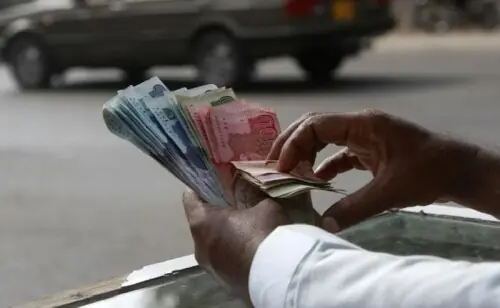In the small suburban town of Rodala, located in Jaranwala, Faisalabad, there sits a cobbler in the main bazaar, Munawar Shakeel, who has been repairing the shoes of the villagers for three decades now.
But in recent years, his customers are less interested in getting their shoes repaired and more interested in listening to his verses on the sweet and bitter realities of life.
Munawar is a poet.
He is the author of five Punjabi poetry books, and with the poor and downtrodden as the subject of his poetry, he is considered a major voice of people living in suburban areas.
Born in 1969, Munawar lost his father during his childhood, and he was unable to receive any sort of formal education. Even then, he started composing verses as early as the age of 13. Ultimately, his first book Soch Samandar was published in 2004.
Munawar tells me that cobbling is his family profession. He says: “I make Rs250 to Rs300 daily by selling newspapers at local shops, and repairing shoes. From this money, I set aside Rs10 daily for getting my books published.”
His second book Pardes Di Sangat was published in 2005; third book Saddiyan De Bhait in 2009; fourth book Jhora Dhap Gawachi Da in 2011; and fifth Akhaan Mitti Ho Gaiyaan was published in 2013.
They are all award-winning books.
Munawar is a member of literary groups like the Royal Adabi Academy, Jaranwala and the Naqeebi Karvan-e-Adab. He has also received awards from organisations such as Ashna-e-Saandal Bar, Pakistan Writers’ Guild, and Punjabi Sevak.
 |
| “I make Rs250 to Rs300 daily by selling newspapers at local shops and repairing shoes.”—Photo by author |
Talking about his poetry, he said that the elite and middle classes of the society have always subjected the lower classes to discrimination, and there is no one to raise a voice against the miseries and discrimination they face.
“I want to speak for the lower classes through my poetry, and those things which cannot be said directly, I want to say them through verse.”
Innu kinne paani ditta, innu kinne boya aey
Patthar de jo seene uttey, boota ugya hoya aey
[Who watered it, who sowed it,
The plant that grew on a heart of stone]
Munawar says that as a child, he most wanted an education but the early death of his father and the scarcity of resources had made it impossible.
“Thus, I purchased books myself and started reading. The habit is so ingrained now that I can’t sleep if I don’t read for four hours daily after work.”
The poet consciously chooses only to write in his mother tongue Punjabi.
“Punjabi is the mother tongue of Punjabis, and it is their right to be taught in this language. It is the job of the government to promote Punjabi and all regional languages.”
He thinks that for being a good poet, it is necessary to feel the pain of the humanity, which should reflect in the poetry.
His sixth book Taanghan, consisting 112 of his ghazals, will be available in markets by the end of this year.
“There is glory in hard work. I have no shame in repairing shoes, but I want people to be more aware, and I want them to read books so we can also stand in the ranks of developed nations.”
Munawar Shakeel’s teacher in literature, Ghulam Mustafa Azad Naqeebi, says people in suburban areas are not short of ability, but they often get left behind due to a shortage of resources.
According to the teacher, Munawar's poetry throbs with the pain of the downtrodden people. It is far from the traditional metaphors of love and intimacy, and closer to the needs, wishes, and difficulties of the common people.
Note: If you wish to purchase Munawar Shakeel’s books, send an e-mail at faisalabad@lokpunjab.org with your name, address, and phone number.
This article first appeared on Faisalabad Sujag and has been reproduced with permission. Translation by Bilal Karim Mughal.

































